Analysis of Asylum Seeker Detention in Processing Centers: A Report
VerifiedAdded on 2023/04/24
|8
|1902
|138
Report
AI Summary
This report analyzes the detention of asylum seekers in Australian processing centers, focusing on the ethical and human rights issues involved. It explores the concept of the common good, human dignity, community engagement, and subsidiarity within the context of asylum seeker detention. The report highlights the negative impacts of detention on asylum seekers, including poor living conditions, inadequate healthcare, and violations of basic rights. It emphasizes the importance of advocacy and policy changes to ensure fair treatment and the protection of asylum seekers' rights, referencing the principles of Catholic social teaching. The report proposes strategies for improving the lives of asylum seekers, such as providing safe and permanent solutions, revising detention policies, improving healthcare access, and fostering community engagement. The report concludes by advocating for immediate action to address the problems faced by asylum seekers and promote a healthy and terror-free life for them.
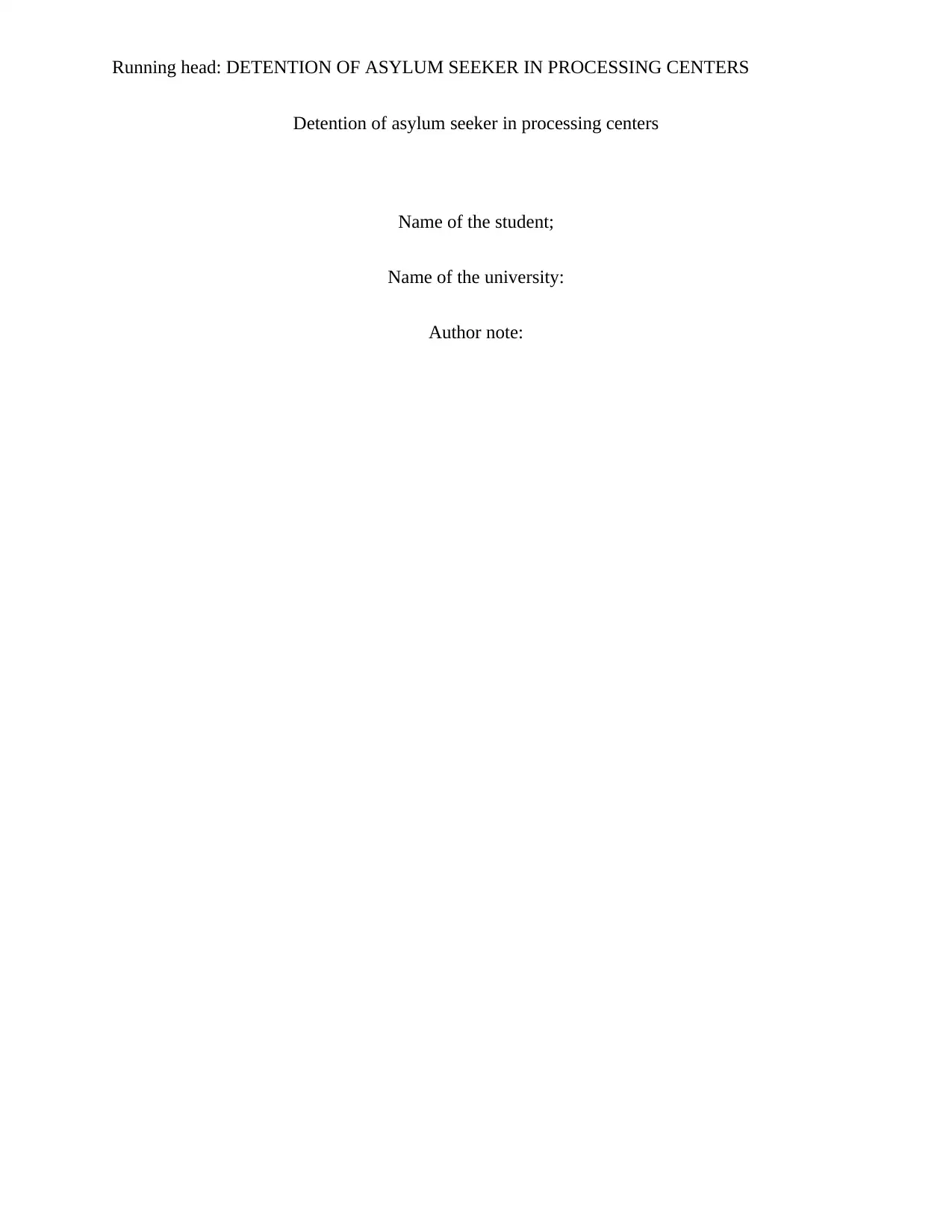
Running head: DETENTION OF ASYLUM SEEKER IN PROCESSING CENTERS
Detention of asylum seeker in processing centers
Name of the student;
Name of the university:
Author note:
Detention of asylum seeker in processing centers
Name of the student;
Name of the university:
Author note:
Paraphrase This Document
Need a fresh take? Get an instant paraphrase of this document with our AI Paraphraser
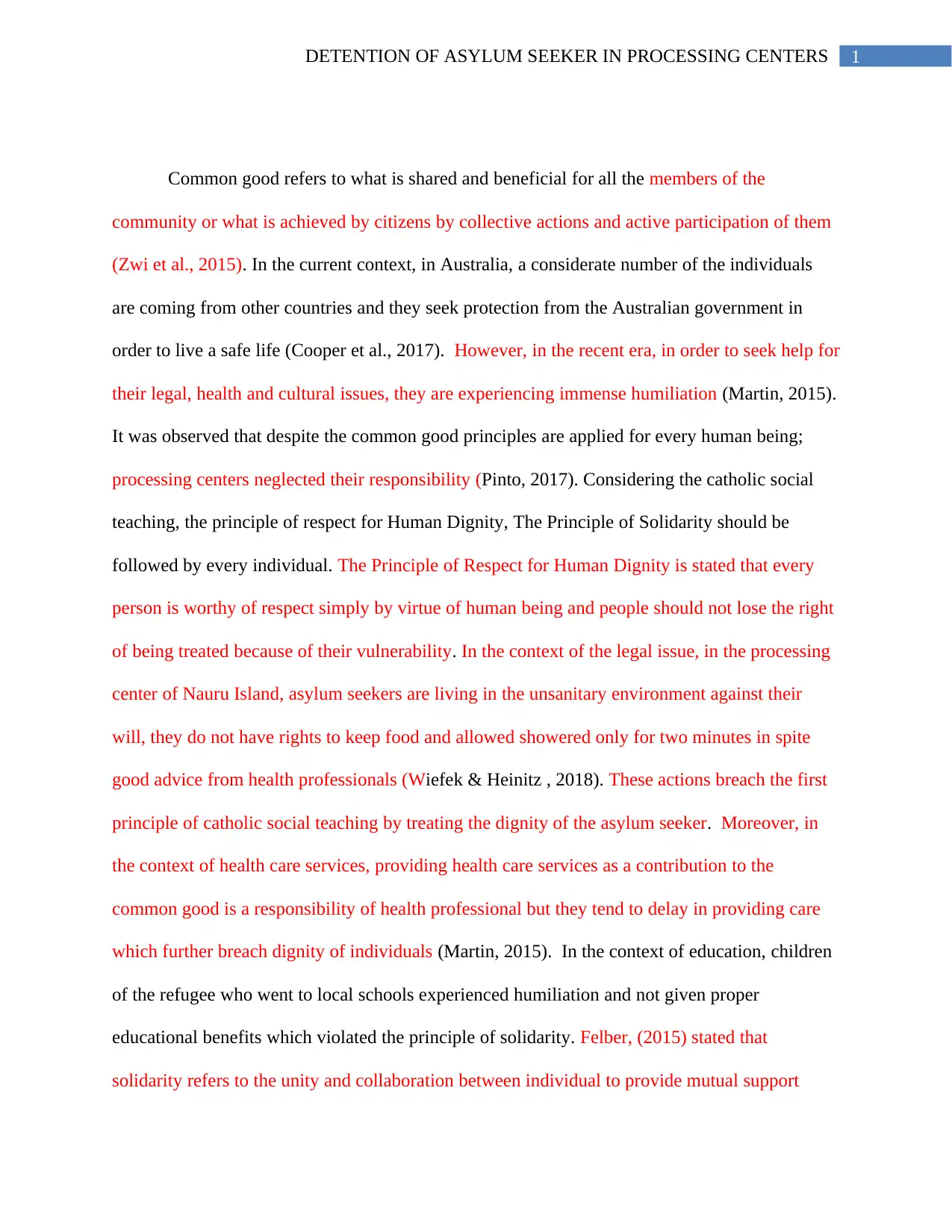
1DETENTION OF ASYLUM SEEKER IN PROCESSING CENTERS
Common good refers to what is shared and beneficial for all the members of the
community or what is achieved by citizens by collective actions and active participation of them
(Zwi et al., 2015). In the current context, in Australia, a considerate number of the individuals
are coming from other countries and they seek protection from the Australian government in
order to live a safe life (Cooper et al., 2017). However, in the recent era, in order to seek help for
their legal, health and cultural issues, they are experiencing immense humiliation (Martin, 2015).
It was observed that despite the common good principles are applied for every human being;
processing centers neglected their responsibility (Pinto, 2017). Considering the catholic social
teaching, the principle of respect for Human Dignity, The Principle of Solidarity should be
followed by every individual. The Principle of Respect for Human Dignity is stated that every
person is worthy of respect simply by virtue of human being and people should not lose the right
of being treated because of their vulnerability. In the context of the legal issue, in the processing
center of Nauru Island, asylum seekers are living in the unsanitary environment against their
will, they do not have rights to keep food and allowed showered only for two minutes in spite
good advice from health professionals (Wiefek & Heinitz , 2018). These actions breach the first
principle of catholic social teaching by treating the dignity of the asylum seeker. Moreover, in
the context of health care services, providing health care services as a contribution to the
common good is a responsibility of health professional but they tend to delay in providing care
which further breach dignity of individuals (Martin, 2015). In the context of education, children
of the refugee who went to local schools experienced humiliation and not given proper
educational benefits which violated the principle of solidarity. Felber, (2015) stated that
solidarity refers to the unity and collaboration between individual to provide mutual support
Common good refers to what is shared and beneficial for all the members of the
community or what is achieved by citizens by collective actions and active participation of them
(Zwi et al., 2015). In the current context, in Australia, a considerate number of the individuals
are coming from other countries and they seek protection from the Australian government in
order to live a safe life (Cooper et al., 2017). However, in the recent era, in order to seek help for
their legal, health and cultural issues, they are experiencing immense humiliation (Martin, 2015).
It was observed that despite the common good principles are applied for every human being;
processing centers neglected their responsibility (Pinto, 2017). Considering the catholic social
teaching, the principle of respect for Human Dignity, The Principle of Solidarity should be
followed by every individual. The Principle of Respect for Human Dignity is stated that every
person is worthy of respect simply by virtue of human being and people should not lose the right
of being treated because of their vulnerability. In the context of the legal issue, in the processing
center of Nauru Island, asylum seekers are living in the unsanitary environment against their
will, they do not have rights to keep food and allowed showered only for two minutes in spite
good advice from health professionals (Wiefek & Heinitz , 2018). These actions breach the first
principle of catholic social teaching by treating the dignity of the asylum seeker. Moreover, in
the context of health care services, providing health care services as a contribution to the
common good is a responsibility of health professional but they tend to delay in providing care
which further breach dignity of individuals (Martin, 2015). In the context of education, children
of the refugee who went to local schools experienced humiliation and not given proper
educational benefits which violated the principle of solidarity. Felber, (2015) stated that
solidarity refers to the unity and collaboration between individual to provide mutual support
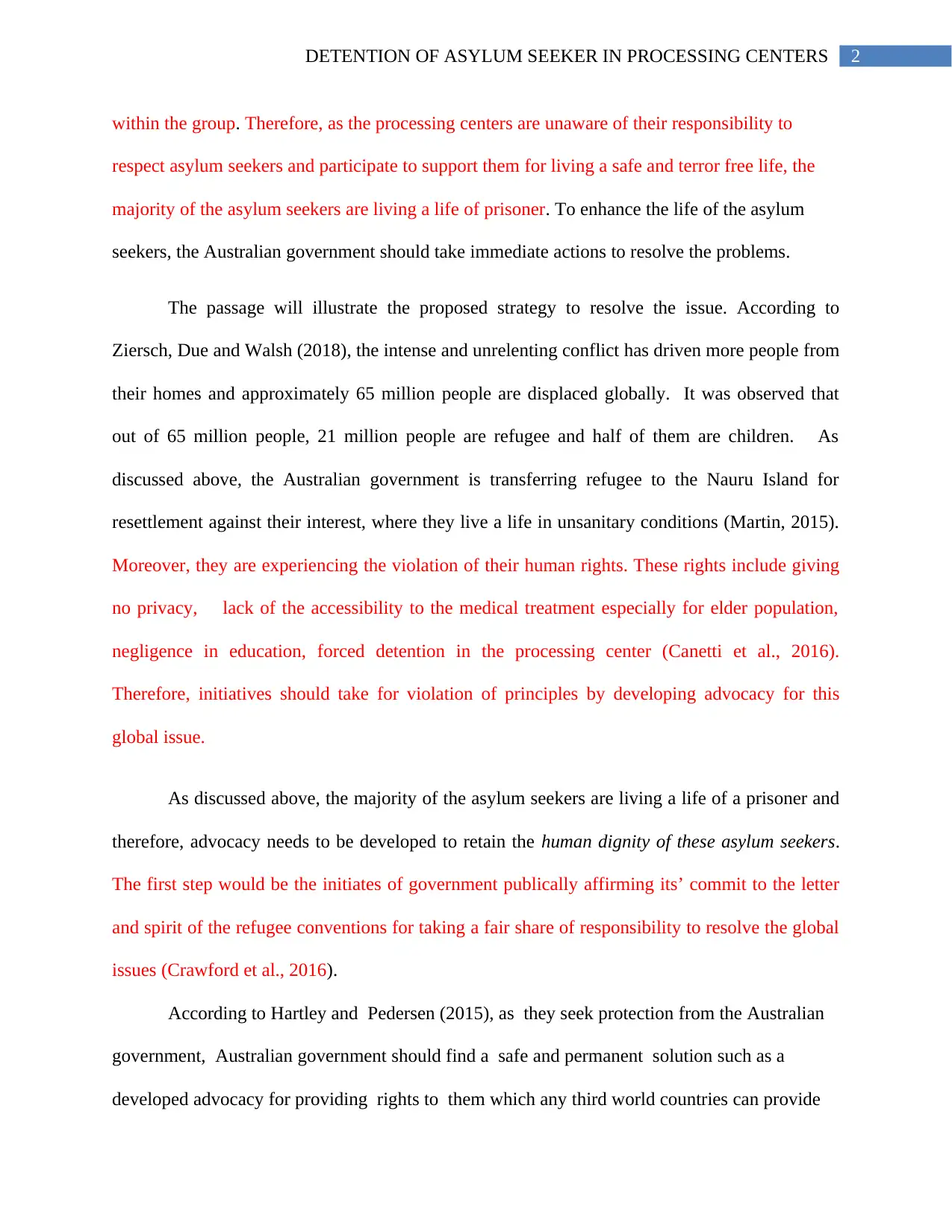
2DETENTION OF ASYLUM SEEKER IN PROCESSING CENTERS
within the group. Therefore, as the processing centers are unaware of their responsibility to
respect asylum seekers and participate to support them for living a safe and terror free life, the
majority of the asylum seekers are living a life of prisoner. To enhance the life of the asylum
seekers, the Australian government should take immediate actions to resolve the problems.
The passage will illustrate the proposed strategy to resolve the issue. According to
Ziersch, Due and Walsh (2018), the intense and unrelenting conflict has driven more people from
their homes and approximately 65 million people are displaced globally. It was observed that
out of 65 million people, 21 million people are refugee and half of them are children. As
discussed above, the Australian government is transferring refugee to the Nauru Island for
resettlement against their interest, where they live a life in unsanitary conditions (Martin, 2015).
Moreover, they are experiencing the violation of their human rights. These rights include giving
no privacy, lack of the accessibility to the medical treatment especially for elder population,
negligence in education, forced detention in the processing center (Canetti et al., 2016).
Therefore, initiatives should take for violation of principles by developing advocacy for this
global issue.
As discussed above, the majority of the asylum seekers are living a life of a prisoner and
therefore, advocacy needs to be developed to retain the human dignity of these asylum seekers.
The first step would be the initiates of government publically affirming its’ commit to the letter
and spirit of the refugee conventions for taking a fair share of responsibility to resolve the global
issues (Crawford et al., 2016).
According to Hartley and Pedersen (2015), as they seek protection from the Australian
government, Australian government should find a safe and permanent solution such as a
developed advocacy for providing rights to them which any third world countries can provide
within the group. Therefore, as the processing centers are unaware of their responsibility to
respect asylum seekers and participate to support them for living a safe and terror free life, the
majority of the asylum seekers are living a life of prisoner. To enhance the life of the asylum
seekers, the Australian government should take immediate actions to resolve the problems.
The passage will illustrate the proposed strategy to resolve the issue. According to
Ziersch, Due and Walsh (2018), the intense and unrelenting conflict has driven more people from
their homes and approximately 65 million people are displaced globally. It was observed that
out of 65 million people, 21 million people are refugee and half of them are children. As
discussed above, the Australian government is transferring refugee to the Nauru Island for
resettlement against their interest, where they live a life in unsanitary conditions (Martin, 2015).
Moreover, they are experiencing the violation of their human rights. These rights include giving
no privacy, lack of the accessibility to the medical treatment especially for elder population,
negligence in education, forced detention in the processing center (Canetti et al., 2016).
Therefore, initiatives should take for violation of principles by developing advocacy for this
global issue.
As discussed above, the majority of the asylum seekers are living a life of a prisoner and
therefore, advocacy needs to be developed to retain the human dignity of these asylum seekers.
The first step would be the initiates of government publically affirming its’ commit to the letter
and spirit of the refugee conventions for taking a fair share of responsibility to resolve the global
issues (Crawford et al., 2016).
According to Hartley and Pedersen (2015), as they seek protection from the Australian
government, Australian government should find a safe and permanent solution such as a
developed advocacy for providing rights to them which any third world countries can provide
⊘ This is a preview!⊘
Do you want full access?
Subscribe today to unlock all pages.

Trusted by 1+ million students worldwide
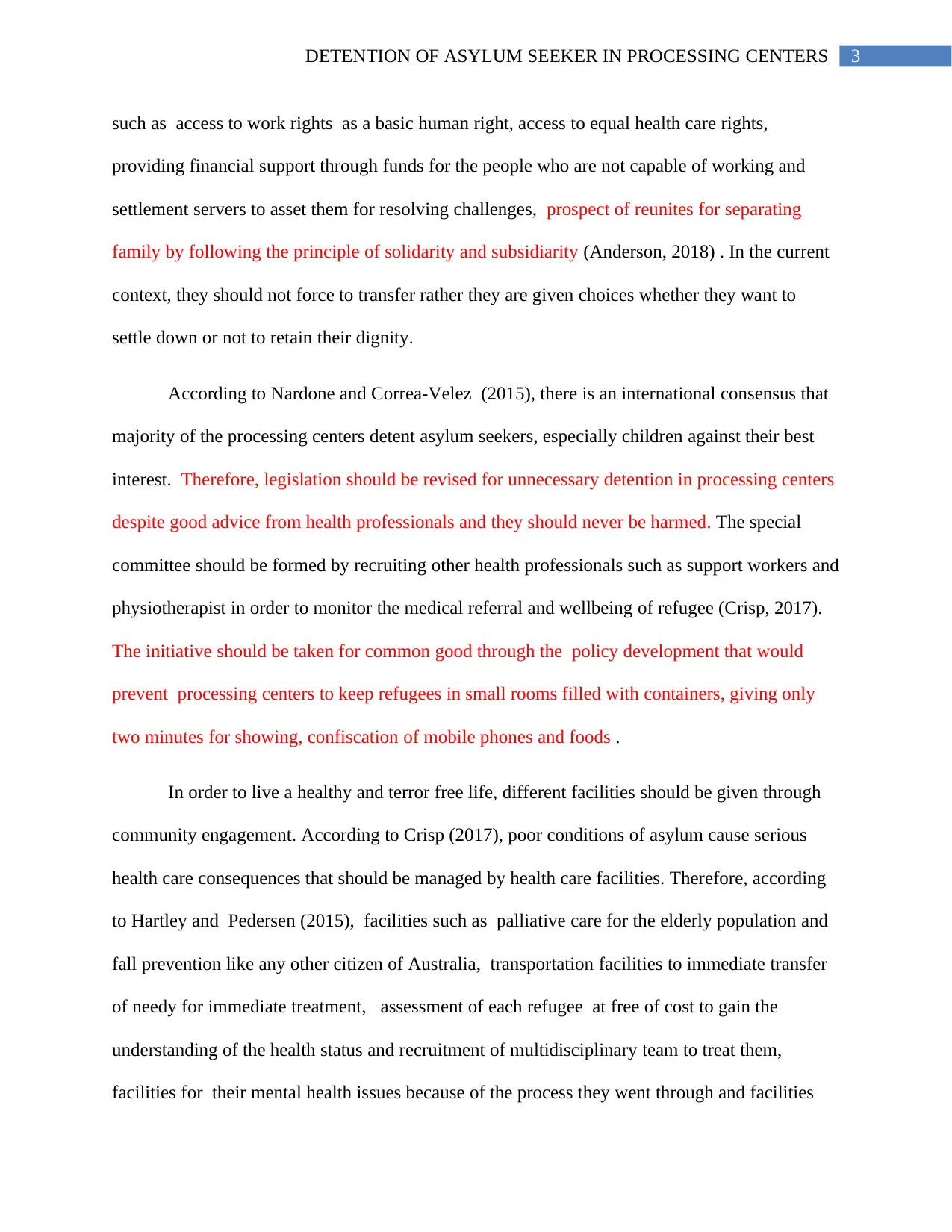
3DETENTION OF ASYLUM SEEKER IN PROCESSING CENTERS
such as access to work rights as a basic human right, access to equal health care rights,
providing financial support through funds for the people who are not capable of working and
settlement servers to asset them for resolving challenges, prospect of reunites for separating
family by following the principle of solidarity and subsidiarity (Anderson, 2018) . In the current
context, they should not force to transfer rather they are given choices whether they want to
settle down or not to retain their dignity.
According to Nardone and Correa-Velez (2015), there is an international consensus that
majority of the processing centers detent asylum seekers, especially children against their best
interest. Therefore, legislation should be revised for unnecessary detention in processing centers
despite good advice from health professionals and they should never be harmed. The special
committee should be formed by recruiting other health professionals such as support workers and
physiotherapist in order to monitor the medical referral and wellbeing of refugee (Crisp, 2017).
The initiative should be taken for common good through the policy development that would
prevent processing centers to keep refugees in small rooms filled with containers, giving only
two minutes for showing, confiscation of mobile phones and foods .
In order to live a healthy and terror free life, different facilities should be given through
community engagement. According to Crisp (2017), poor conditions of asylum cause serious
health care consequences that should be managed by health care facilities. Therefore, according
to Hartley and Pedersen (2015), facilities such as palliative care for the elderly population and
fall prevention like any other citizen of Australia, transportation facilities to immediate transfer
of needy for immediate treatment, assessment of each refugee at free of cost to gain the
understanding of the health status and recruitment of multidisciplinary team to treat them,
facilities for their mental health issues because of the process they went through and facilities
such as access to work rights as a basic human right, access to equal health care rights,
providing financial support through funds for the people who are not capable of working and
settlement servers to asset them for resolving challenges, prospect of reunites for separating
family by following the principle of solidarity and subsidiarity (Anderson, 2018) . In the current
context, they should not force to transfer rather they are given choices whether they want to
settle down or not to retain their dignity.
According to Nardone and Correa-Velez (2015), there is an international consensus that
majority of the processing centers detent asylum seekers, especially children against their best
interest. Therefore, legislation should be revised for unnecessary detention in processing centers
despite good advice from health professionals and they should never be harmed. The special
committee should be formed by recruiting other health professionals such as support workers and
physiotherapist in order to monitor the medical referral and wellbeing of refugee (Crisp, 2017).
The initiative should be taken for common good through the policy development that would
prevent processing centers to keep refugees in small rooms filled with containers, giving only
two minutes for showing, confiscation of mobile phones and foods .
In order to live a healthy and terror free life, different facilities should be given through
community engagement. According to Crisp (2017), poor conditions of asylum cause serious
health care consequences that should be managed by health care facilities. Therefore, according
to Hartley and Pedersen (2015), facilities such as palliative care for the elderly population and
fall prevention like any other citizen of Australia, transportation facilities to immediate transfer
of needy for immediate treatment, assessment of each refugee at free of cost to gain the
understanding of the health status and recruitment of multidisciplinary team to treat them,
facilities for their mental health issues because of the process they went through and facilities
Paraphrase This Document
Need a fresh take? Get an instant paraphrase of this document with our AI Paraphraser
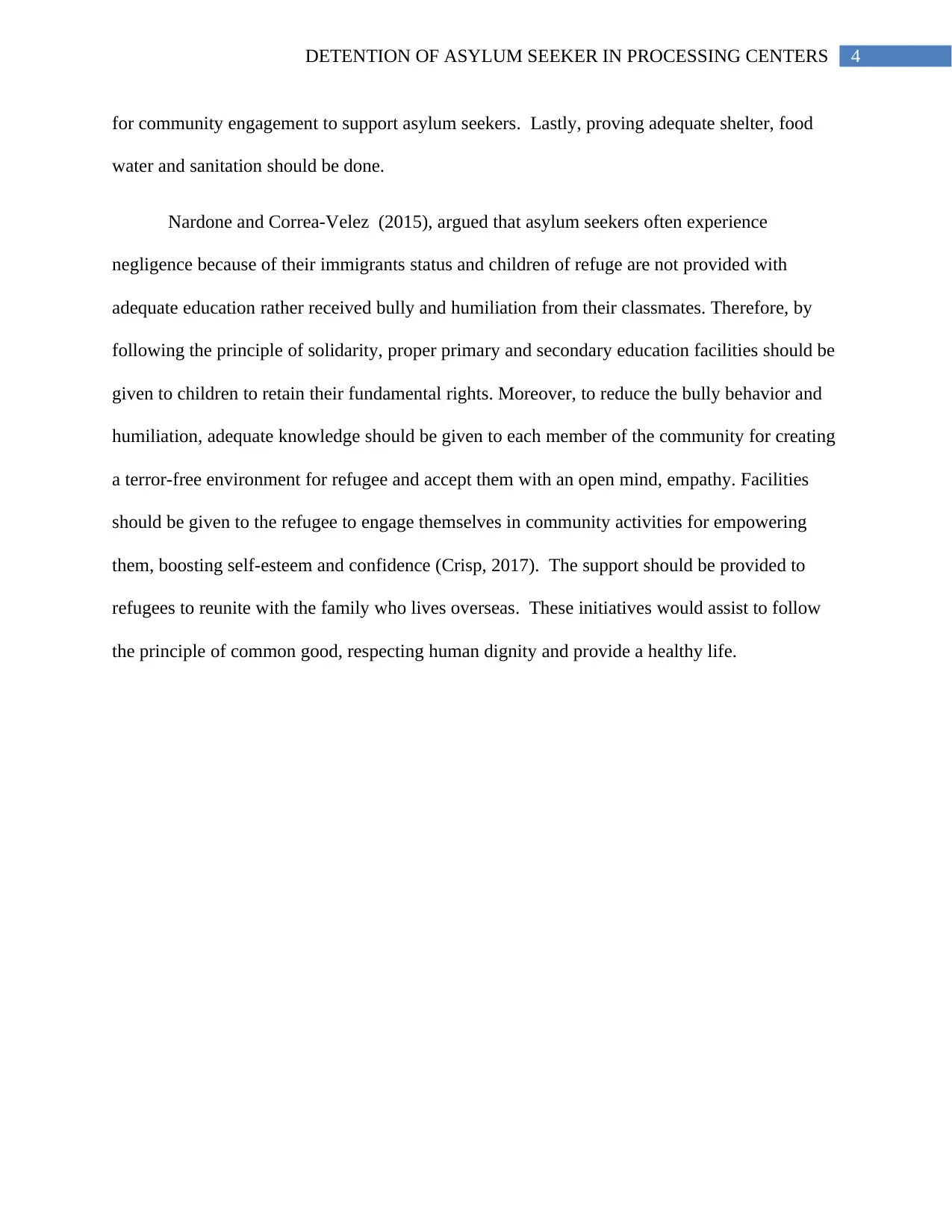
4DETENTION OF ASYLUM SEEKER IN PROCESSING CENTERS
for community engagement to support asylum seekers. Lastly, proving adequate shelter, food
water and sanitation should be done.
Nardone and Correa-Velez (2015), argued that asylum seekers often experience
negligence because of their immigrants status and children of refuge are not provided with
adequate education rather received bully and humiliation from their classmates. Therefore, by
following the principle of solidarity, proper primary and secondary education facilities should be
given to children to retain their fundamental rights. Moreover, to reduce the bully behavior and
humiliation, adequate knowledge should be given to each member of the community for creating
a terror-free environment for refugee and accept them with an open mind, empathy. Facilities
should be given to the refugee to engage themselves in community activities for empowering
them, boosting self-esteem and confidence (Crisp, 2017). The support should be provided to
refugees to reunite with the family who lives overseas. These initiatives would assist to follow
the principle of common good, respecting human dignity and provide a healthy life.
for community engagement to support asylum seekers. Lastly, proving adequate shelter, food
water and sanitation should be done.
Nardone and Correa-Velez (2015), argued that asylum seekers often experience
negligence because of their immigrants status and children of refuge are not provided with
adequate education rather received bully and humiliation from their classmates. Therefore, by
following the principle of solidarity, proper primary and secondary education facilities should be
given to children to retain their fundamental rights. Moreover, to reduce the bully behavior and
humiliation, adequate knowledge should be given to each member of the community for creating
a terror-free environment for refugee and accept them with an open mind, empathy. Facilities
should be given to the refugee to engage themselves in community activities for empowering
them, boosting self-esteem and confidence (Crisp, 2017). The support should be provided to
refugees to reunite with the family who lives overseas. These initiatives would assist to follow
the principle of common good, respecting human dignity and provide a healthy life.
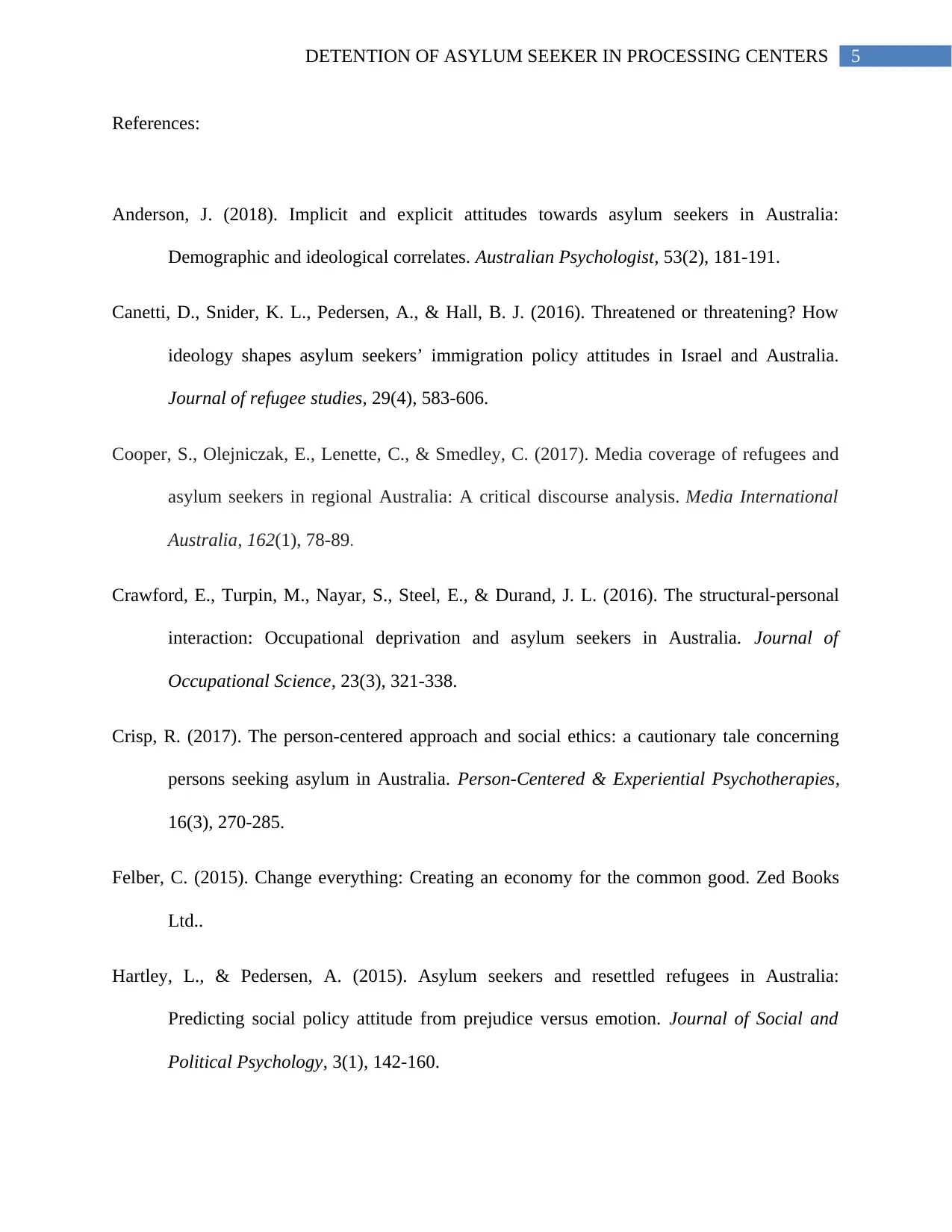
5DETENTION OF ASYLUM SEEKER IN PROCESSING CENTERS
References:
Anderson, J. (2018). Implicit and explicit attitudes towards asylum seekers in Australia:
Demographic and ideological correlates. Australian Psychologist, 53(2), 181-191.
Canetti, D., Snider, K. L., Pedersen, A., & Hall, B. J. (2016). Threatened or threatening? How
ideology shapes asylum seekers’ immigration policy attitudes in Israel and Australia.
Journal of refugee studies, 29(4), 583-606.
Cooper, S., Olejniczak, E., Lenette, C., & Smedley, C. (2017). Media coverage of refugees and
asylum seekers in regional Australia: A critical discourse analysis. Media International
Australia, 162(1), 78-89.
Crawford, E., Turpin, M., Nayar, S., Steel, E., & Durand, J. L. (2016). The structural-personal
interaction: Occupational deprivation and asylum seekers in Australia. Journal of
Occupational Science, 23(3), 321-338.
Crisp, R. (2017). The person-centered approach and social ethics: a cautionary tale concerning
persons seeking asylum in Australia. Person-Centered & Experiential Psychotherapies,
16(3), 270-285.
Felber, C. (2015). Change everything: Creating an economy for the common good. Zed Books
Ltd..
Hartley, L., & Pedersen, A. (2015). Asylum seekers and resettled refugees in Australia:
Predicting social policy attitude from prejudice versus emotion. Journal of Social and
Political Psychology, 3(1), 142-160.
References:
Anderson, J. (2018). Implicit and explicit attitudes towards asylum seekers in Australia:
Demographic and ideological correlates. Australian Psychologist, 53(2), 181-191.
Canetti, D., Snider, K. L., Pedersen, A., & Hall, B. J. (2016). Threatened or threatening? How
ideology shapes asylum seekers’ immigration policy attitudes in Israel and Australia.
Journal of refugee studies, 29(4), 583-606.
Cooper, S., Olejniczak, E., Lenette, C., & Smedley, C. (2017). Media coverage of refugees and
asylum seekers in regional Australia: A critical discourse analysis. Media International
Australia, 162(1), 78-89.
Crawford, E., Turpin, M., Nayar, S., Steel, E., & Durand, J. L. (2016). The structural-personal
interaction: Occupational deprivation and asylum seekers in Australia. Journal of
Occupational Science, 23(3), 321-338.
Crisp, R. (2017). The person-centered approach and social ethics: a cautionary tale concerning
persons seeking asylum in Australia. Person-Centered & Experiential Psychotherapies,
16(3), 270-285.
Felber, C. (2015). Change everything: Creating an economy for the common good. Zed Books
Ltd..
Hartley, L., & Pedersen, A. (2015). Asylum seekers and resettled refugees in Australia:
Predicting social policy attitude from prejudice versus emotion. Journal of Social and
Political Psychology, 3(1), 142-160.
⊘ This is a preview!⊘
Do you want full access?
Subscribe today to unlock all pages.

Trusted by 1+ million students worldwide
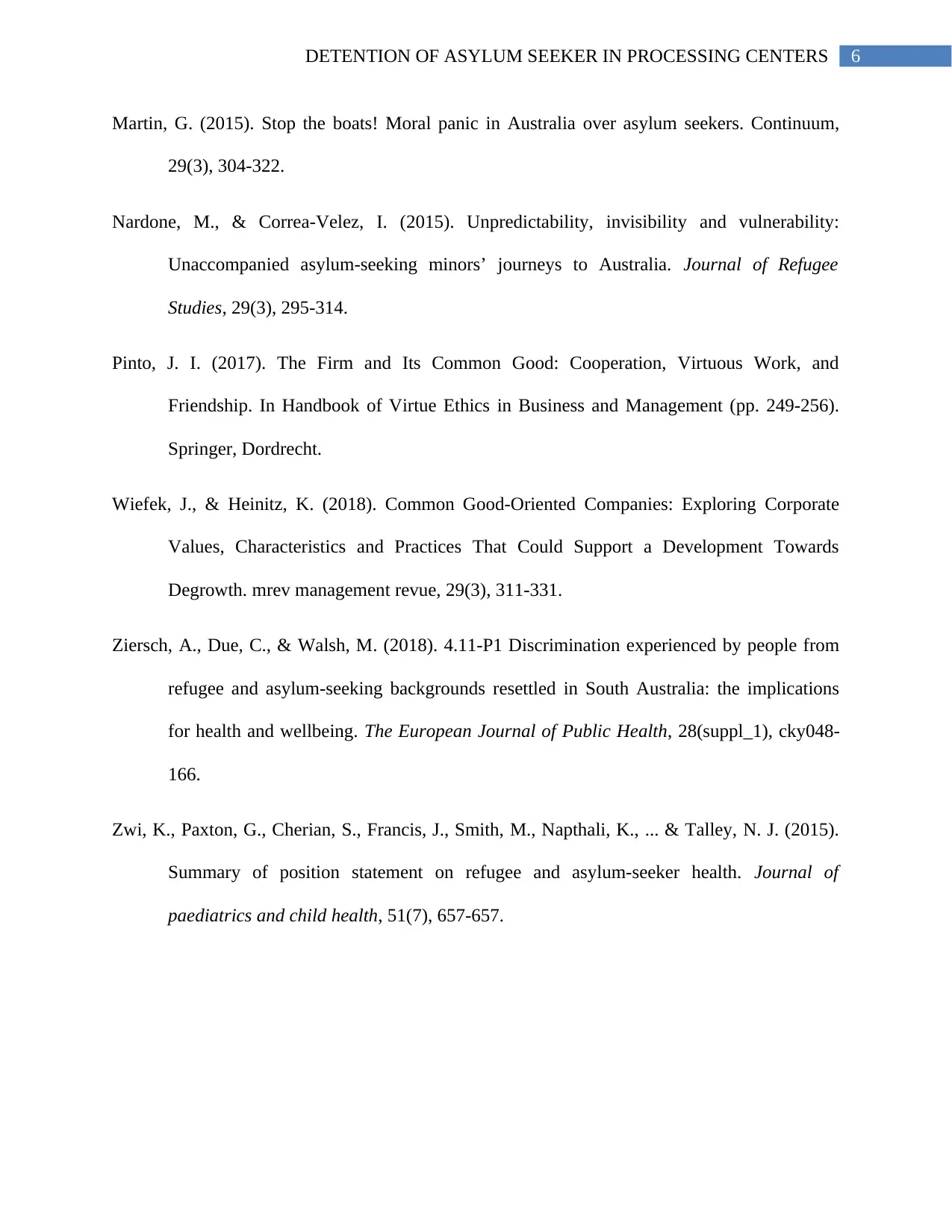
6DETENTION OF ASYLUM SEEKER IN PROCESSING CENTERS
Martin, G. (2015). Stop the boats! Moral panic in Australia over asylum seekers. Continuum,
29(3), 304-322.
Nardone, M., & Correa-Velez, I. (2015). Unpredictability, invisibility and vulnerability:
Unaccompanied asylum-seeking minors’ journeys to Australia. Journal of Refugee
Studies, 29(3), 295-314.
Pinto, J. I. (2017). The Firm and Its Common Good: Cooperation, Virtuous Work, and
Friendship. In Handbook of Virtue Ethics in Business and Management (pp. 249-256).
Springer, Dordrecht.
Wiefek, J., & Heinitz, K. (2018). Common Good-Oriented Companies: Exploring Corporate
Values, Characteristics and Practices That Could Support a Development Towards
Degrowth. mrev management revue, 29(3), 311-331.
Ziersch, A., Due, C., & Walsh, M. (2018). 4.11-P1 Discrimination experienced by people from
refugee and asylum-seeking backgrounds resettled in South Australia: the implications
for health and wellbeing. The European Journal of Public Health, 28(suppl_1), cky048-
166.
Zwi, K., Paxton, G., Cherian, S., Francis, J., Smith, M., Napthali, K., ... & Talley, N. J. (2015).
Summary of position statement on refugee and asylum‐seeker health. Journal of
paediatrics and child health, 51(7), 657-657.
Martin, G. (2015). Stop the boats! Moral panic in Australia over asylum seekers. Continuum,
29(3), 304-322.
Nardone, M., & Correa-Velez, I. (2015). Unpredictability, invisibility and vulnerability:
Unaccompanied asylum-seeking minors’ journeys to Australia. Journal of Refugee
Studies, 29(3), 295-314.
Pinto, J. I. (2017). The Firm and Its Common Good: Cooperation, Virtuous Work, and
Friendship. In Handbook of Virtue Ethics in Business and Management (pp. 249-256).
Springer, Dordrecht.
Wiefek, J., & Heinitz, K. (2018). Common Good-Oriented Companies: Exploring Corporate
Values, Characteristics and Practices That Could Support a Development Towards
Degrowth. mrev management revue, 29(3), 311-331.
Ziersch, A., Due, C., & Walsh, M. (2018). 4.11-P1 Discrimination experienced by people from
refugee and asylum-seeking backgrounds resettled in South Australia: the implications
for health and wellbeing. The European Journal of Public Health, 28(suppl_1), cky048-
166.
Zwi, K., Paxton, G., Cherian, S., Francis, J., Smith, M., Napthali, K., ... & Talley, N. J. (2015).
Summary of position statement on refugee and asylum‐seeker health. Journal of
paediatrics and child health, 51(7), 657-657.
Paraphrase This Document
Need a fresh take? Get an instant paraphrase of this document with our AI Paraphraser

7DETENTION OF ASYLUM SEEKER IN PROCESSING CENTERS
1 out of 8
Related Documents
Your All-in-One AI-Powered Toolkit for Academic Success.
+13062052269
info@desklib.com
Available 24*7 on WhatsApp / Email
![[object Object]](/_next/static/media/star-bottom.7253800d.svg)
Unlock your academic potential
Copyright © 2020–2026 A2Z Services. All Rights Reserved. Developed and managed by ZUCOL.




